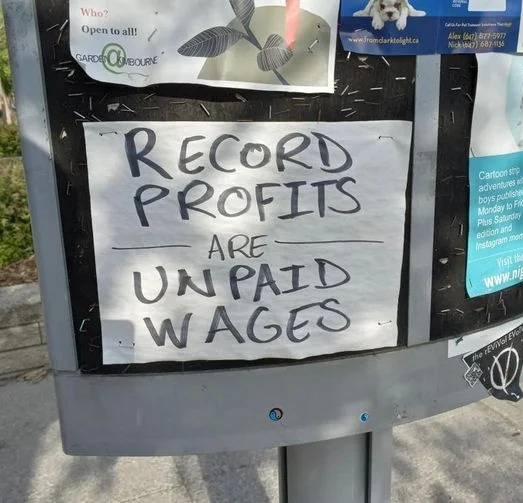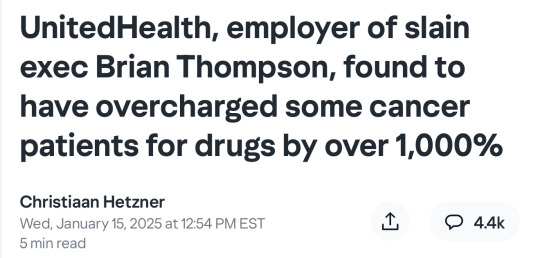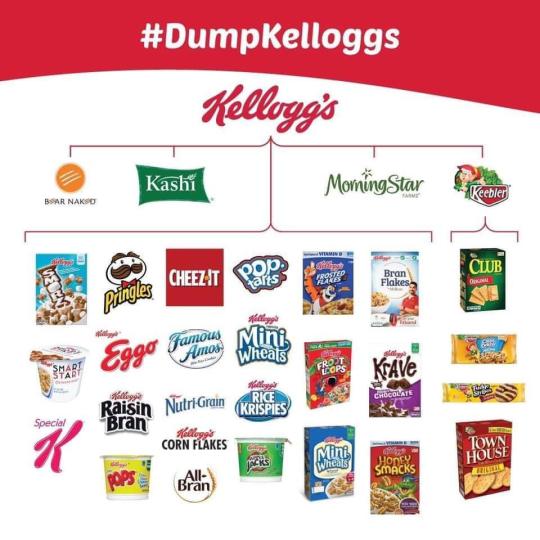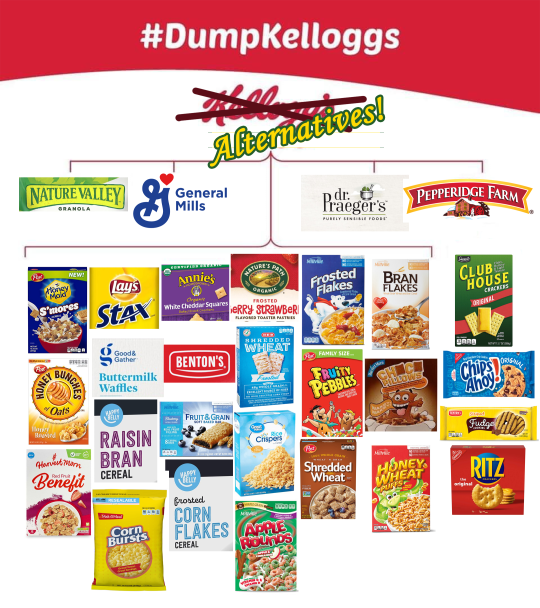#Price gouging
Explore tagged Tumblr posts
Text

When were you radicalized?
Guess what? Trump and MAGA will make this worse.
16K notes
·
View notes
Text

Source

Source
#capitalism#eat the rich#price gouging#tax the rich#income inequality#news#the left#twitter post#current events#progressive
7K notes
·
View notes
Text
@crw4history Before the price cap insulin (a nearly 100 year old drug) in the US cost 700% more than the next MOST EXPENSIVE COUNTRY (Japan) which is also 1400% more than the cheapest (Australia). Obscenely massive price hikes because healthcare products have rigidly inelastic demand is not new or unexpected when they are deregulated.


1K notes
·
View notes
Photo

record profits are unpaid wages
#wages#workers vs capital#workers rights#labor vs capital#capital vs labor#labor rights#labor#price gouging
34K notes
·
View notes
Text

#republican oligarchs and their corporations are price gouging#price gouging#corporate greed#republican assholes#maga morons
672 notes
·
View notes
Text



UnitedHealth Group is charging patients a markup for key life-saving drugs that could easily exceed their cost by a factor of ten or more, according to findings from the Federal Trade Commission.
The report, which levels the same allegations at CVS and Cigna, is the latest indictment of America’s broken healthcare system and comes on the heels of last month’s shocking murder of UnitedHealthcare CEO Brian Thompson.
The U.S. is notorious for incurring the highest costs per capita of any wealthy nation, yet failing to achieve an even remotely equivalent improvement in patient outcomes versus Europe’s social market-based economies.
Critics argue that is due largely to the highly opaque manner in which needless markups are hidden to conceal inefficiencies that serve various vested interests. These include, but are not limited to, the big three drug middlemen known as pharmacy benefit managers (PBMs).
According to the FTC report, UnitedHealth’s OptumRx, along with Cigna’s Express Scripts and CVS Caremark Rx, were able to collectively pocket $7.3 billion in added revenue above cost during the five year period of the study through 2022.
“The Big 3 PBMs marked up numerous specialty generic drugs dispensed at their affiliated pharmacies by thousands of percent, and many others by hundreds of percent,” it concluded.
A thousand percent increase in the price of a drug that costs $10 wholesale would result in a retail price of $110.
This markup rate applied to 22% of the specialty therapies examined, including Imatinib, a generic used to treat leukemia, or non-oncological Tadalafil for pulmonary hypertension. Others such as Lamivudine needed by HIV-positive patients were nearly quadruple the price of their acquisition cost.
Independent Vermont Sen. Bernie Sanders has been conducting Congressional hearings in an attempt to shed light on the problems posed by these drug middlemen as well as drugmakers themselves.
(continue reading)
#politics#healthcare#united healthcare#insurance#brian thompson#price gouging#capitalism#luigi mangione#ftc#lina khan#oncology#profitized healthcare#privatized healthcare#corporate greed#cvs#cigna#pharmacy benefits managers
412 notes
·
View notes
Text

#boycott self checkout#self checkout steals jobs#corporate greed#price gouging#ceo greed#oligarch greed#Republican greed#Trump’s lies matter
570 notes
·
View notes
Text
When the restaurant chain tries to get you excited for a "deal" while still price gouging you:

81 notes
·
View notes
Text

The wrong side of everything is an accurate description of the GOP.
MAGA will blame Biden for greedflation, then attack Harris when she goes after greedflation.
Ultimately, MAGA will get lower prices and never give credit to Democrats.
2K notes
·
View notes
Text


Source

#corporate greed#capitalism#election 2024#target#abolish capitalism#end capitalism#the left#progressive#current events#news#wealth inequality#income inequality#price gouging
858 notes
·
View notes
Text
Capitalism is broken

123 notes
·
View notes
Text

#twitter#tweet#tweets#la times#looting#wild fires#los angeles fires#california wildfires#california fires#wildfire#pacific palisades#bsky#price gouging
186 notes
·
View notes
Text
Surveillance pricing

THIS WEEKEND (June 7–9), I'm in AMHERST, NEW YORK to keynote the 25th Annual Media Ecology Association Convention and accept the Neil Postman Award for Career Achievement in Public Intellectual Activity.

Correction, 7 June 2024: The initial version of this article erroneously described Jeffrey Roper as the founder of ATPCO. He benefited from ATPCO, but did not co-found it. The initial version of this article called ATPCO "an illegal airline price-fixing service"; while ATPCO provides information that the airlines use to set prices, it does not set prices itself, and while the DOJ investigated the company, they did not pursue a judgment declaring the service to be illegal. I regret the error.
Noted anti-capitalist agitator Adam Smith had it right: "People of the same trade seldom meet together, even for merriment and diversion, but the conversation ends in a conspiracy against the public, or in some contrivance to raise prices."
Despite being a raving commie loon, Smith's observation was so undeniably true that regulators, policymakers, and economists couldn't help but acknowledge that it was true. The trustbusting era was defined by this idea: if we let the number of companies in a sector get too small, or if we let one or a few companies get too big, they'll eventually start to rig prices.
What's more, once an industry contracts corporate gigantism, it will become too big to jail, able to outspend and overpower the regulators charged with reining in its cheating. Anyone who believes Smith's self-evident maxim had to accept its conclusion: that companies had to be kept smaller than the state that regulated them. This wasn't about "punishing bigness" – it was the necessary precondition for a functioning market economy.
We kept companies small for the same reason that we limited the height of skyscrapers: not because we opposed height, or failed to appreciate the value of a really good penthouse view – rather, to keep the building from falling over and wrecking all the adjacent buildings and the lives of the people inside them.
Starting in the neoliberal era – Carter, then Reagan – we changed our tune. We liked big business. A business that got big was doing something right. It was perverse to shut down our best companies. Instead, we'd simply ban big companies from rigging prices. This was called the "consumer welfare" theory of antitrust. It was a total failure.
40 years later, nearly every industry is dominated by a handful of companies, and these companies price-gouge us with abandon. Worse, they use their gigantic ripoff winnings to fill war-chests that fund the corruption of democracy, capturing regulators so that they can rip us off even more, while ignoring labor, privacy and environmental law and ducking taxes.
It turns out that keeping gigantic, opaque, complex corporations honest is really hard. They have so many ways to shuffle money around that it's nearly impossible to figure out what they're doing. Digitalization makes things a million times worse, because computers allow businesses to alter their processes so they operate differently for every customer, and even for every interaction.
This is Dieselgate times a billion: VW rigged its cars to detect when they were undergoing emissions testing and switch to a less polluting, more compliant mode. But when they were on the open road, they spewed lethal quantities of toxic gas, killing people by the thousands. Computers don't make corporate leaders more evil, but they let evil corporate leaders execute far more complex and nefarious plans. Digitalization is a corporate moral hazard, making it just too easy and tempting to rig the game.
That's why Toyota, the largest car-maker in the world, just did Dieselgate again, more than a decade later. Digitalization is a temptation no giant company can resist:
https://www.bbc.com/news/articles/c1wwj1p2wdyo
For forty years, pro-monopoly cheerleaders insisted that we could allow companies to grow to unimaginable scale and still prevent cheating. They passed rules banning companies from explicitly forming agreements to rig prices. About ten seconds later, new middlemen popped up offering "information brokerages" that helped companies rig prices without talking to one another.
Take Agri Stats: the country's hyperconcentrated meatpacking industry pays Agri Stats to "consult on prices." They provide Agri Stats with a list of their prices, and then Agri Stats suggests changes based on its analysis. What does that analysis consist of? Comparing the company's prices to its competitors, who are also Agri Stats customers:
https://pluralistic.net/2023/10/04/dont-let-your-meat-loaf/#meaty-beaty-big-and-bouncy
In other words, Agri Stats finds the highest price for each product in the sector, then "advises" all the companies with lower prices to raise their prices to the "competitive" level, creating a one-way ratchet that sends the price of food higher and higher.
More and more sectors have an Agri Stats, and digitalization has made this price-gouging system faster, more efficient, and accessible to sectors with less concentration. Landlords, for example, have tapped into Realpage, a "data broker" that the same thing to your rent that Agri Stats does to meat prices. Realpage requires the landlords who sign up for its service to accept its "recommendations" on minimum rents, ensuring that prices only go up:
https://popular.info/p/feds-raid-corporate-landlord-escalating
Writing for The American Prospect, Luke Goldstein lays out the many ways in which these digital intermediaries have supercharged the business of price-rigging:
https://prospect.org/economy/2024-06-05-three-algorithms-in-a-room/
Goldstein identifies a kind of patient zero for this ripoff epidemic: Jeffrey Roper, a former Alaska Air exec who benefited from a service that helps airlines set prices. ATPCO was investigated by the DOJ in the 1990s, but the enforcers lost their nerve and settled with the company, which agreed to apply some ornamental fig-leafs to its collusion-machine. Even those cosmetic changes were seemingly a bridge too far Roper, who left the US.
But he came back to serve as Realpage's "principal scientist" – the architect of a nationwide scheme to make rental housing vastly more expensive. For Roper, the barrier to low rents was empathy: landlords felt stirrings of shame when they made shelter unaffordable to working people. Roper called these people "idiots" who sentimentality "costs the whole system."
Sticking a rent-gouging computer between landlords and the people whose lives they ruin is a classic "accountability sink," as described in Dan Davies' new book "The Unaccountability Machine: Why Big Systems Make Terrible Decisions – and How The World Lost its Mind":
https://profilebooks.com/work/the-unaccountability-machine/
It's a form of "empiricism washing": if computers are working in the abstract realm of pure numbers, they're just moving the objective facts of the quantitative realm into the squishy, imperfect qualitative world. Davies' interview on Trashfuture is excellent:
https://trashfuturepodcast.podbean.com/e/fire-sale-at-the-accountability-store-feat-dan-davies/
To rig prices, an industry has to solve three problems: the problem of coming to an agreement to fix prices (economists call this "the collective action problem"); the problem of coming up with a price; and the problem of actually changing prices from moment to moment. This is the ripoff triangle, and like a triangle, it has many stable configurations.
The more concentrated an industry is, the easier it is to decide to rig prices. But if the industry has the benefit of digitalization, it can swap the flexibility and speed of computers for the low collective action costs from concentration. For example, grocers that switch to e-ink shelf tags can make instantaneous price-changes, meaning that every price change is less consequential – if sales fall off after a price-hike, the company can lower them again at the press of a button. That means they can collude less explicitly but still raise prices:
https://pluralistic.net/2024/03/26/glitchbread/#electronic-shelf-tags
My name for this digital flexibility is "twiddling." Businesses with digital back-ends can alter their "business logic" from second to second, and present different prices, payouts, rankings and other key parts of the deal to every supplier or customer they interact with:
https://pluralistic.net/2023/02/19/twiddler/
Not only does twiddling make it easier to rip off suppliers, workers and customers, it also makes these crimes harder to detect. Twiddling made Dieselgate possible, and it also underpinned "Greyball," Uber's secret strategy of refusing to send cars to pick up transportation regulators who would then be able to see firsthand how many laws the company was violating:
https://www.nytimes.com/2017/03/03/technology/uber-greyball-program-evade-authorities.html
Twiddling is so easy that it has brought price-fixing to smaller companies and less concentrated sectors, though the biggest companies still commit crimes on a scale that put these bit-players to shame. In The Prospect, David Dayen investigates the "personalized pricing" ripoff that has turned every transaction into a potential crime-scene:
https://prospect.org/economy/2024-06-04-one-person-one-price/
"Personalized pricing" is the idea that everything you buy should be priced based on analysis of commercial surveillance data that predicts the maximum amount you are willing to pay.
Proponents of this idea – like Harvard's Pricing Lab with its "Billion Prices Project" – insist that this isn't a way to rip you off. Instead, it lets companies lower prices for people who have less ability to pay:
https://thebillionpricesproject.com/
This kind of weaponized credulity is totally on-brand for the pro-monopoly revolution. It's the same wishful thinking that led regulators to encourage monopolies while insisting that it would be possible to prevent "bad" monopolies from raising prices. And, as with monopolies, "personalized pricing" leads to an overall increase in prices. In econspeak, it is a "transfer of wealth from consumer to the seller."
"Personalized pricing" is one of those cuddly euphemisms that should make the hair on the back of your neck stand up. A more apt name for this practice is surveillance pricing, because the "personalization" depends on the vast underground empire of nonconsensual data-harvesting, a gnarly hairball of ad-tech companies, data-brokers, and digital devices with built-in surveillance, from smart speakers to cars:
https://pluralistic.net/2024/03/12/market-failure/#car-wars
Much of this surveillance would be impractical, because no one wants their car, printer, speaker, watch, phone, or insulin-pump to spy on them. The flexibility of digital computers means that users always have the technical ability to change how these gadgets work, so they no longer spy on their users. But an explosion of IP law has made this kind of modification illegal:
https://locusmag.com/2020/09/cory-doctorow-ip/
This is why apps are ground zero for surveillance pricing. The web is an open platform, and web-browsers are legal to modify. The majority of web users have installed ad-blockers that interfere with the surveillance that makes surveillance pricing possible:
https://doc.searls.com/2023/11/11/how-is-the-worlds-biggest-boycott-doing/
But apps are a closed platform, and reverse-engineering and modifying an app is a literal felony – several felonies, in fact. An app is just a web-page skinned with enough IP to make it a felony to modify it to protect your consumer, privacy or labor rights:
https://pluralistic.net/2024/05/07/treacherous-computing/#rewilding-the-internet
(Google is leading a charge to turn the web into the kind of enshittifier's paradise that apps represent, blocking the use of privacy plugins and proposing changes to browser architecture that would allow them to felonize modifying a browser without permission:)
https://pluralistic.net/2023/08/02/self-incrimination/#wei-bai-bai
Apps are a twiddler's playground. Not only can they "customize" every interaction you have with them, but they can block you (or researchers seeking to help you) from recording and analyzing the app's activities. Worse: digital transactions are intimate, contained to the palm of your hand. The grocer whose e-ink shelf-tags flicker and reprice their offerings every few seconds can be collectively observed by people who are in the same place and can start a conversation about, say, whether to come back that night a throw a brick through the store's window to express their displeasure. A digital transaction is a lonely thing, atomized and intrinsically shielded from a public response.
That shielding is hugely important. The public hates surveillance pricing. Time and again, through all of American history, there have been massive and consequential revolts against the idea that every price should be different for every buyer. The Interstate Commerce Commission was founded after Grangers rose up against the rail companies' use of "personalized pricing" to gouge farmers.
Companies know this, which is why surveillance pricing happens in secret. Over and over, every day, you are being gouged through surveillance pricing. The sellers you interact with won't tell you about it, so to root out this practice, we have to look at the B2B sales-pitches from the companies that sell twiddling tools.
One of these companies is Plexure, partly owned by McDonald's, which provides the surveillance-pricing back-ends for McD's, Ikea, 7-Eleven, White Castle and others – basically, any time a company gives you a hard-sell to order via its apps rather than its storefronts or its website, you should assume you're getting twiddled, hard.
These companies use the enshittification playbook to trap you into using their apps. First, they offer discounts to customers who order through their apps – then, once the customers are fully committed to shopping via app, they introduce surveillance pricing and start to jack up the prices.
For example, Plexure boasts that it can predict what day a given customer is getting paid on and use that information to raise prices on all the goods the customer shops for on that day, on the assumption that you're willing to pay more when you've got a healthy bank balance.
The surveillance pricing industry represents another reason for everything you use to spy on you – any data your "smart" TV or Nest thermostat or Ring doorbell can steal from you can be readily monetized – just sell it to a surveillance pricing company, which will use it to figure out how to charge you more for everything you buy, from rent to Happy Meals.
But the vast market for surveillance data is also a potential weakness for the industry. Put frankly: the commercial surveillance industry has a lot of enemies. The only thing it has going for it is that so many of these enemies don't know that what's they're really upset about is surveillance.
Some people are upset because they think Facebook made Grampy into a Qanon. Others, because they think Insta gave their kid anorexia. Some think Tiktok is brainwashing millennials into quoting Osama bin Laden. Some are upset because the cops use Google location data to round up Black Lives Matter protesters, or Jan 6 insurrectionists. Some are angry about deepfake porn. Some are angry because Black people are targeted with ads for overpriced loans or colleges:
https://www.theregister.com/2024/06/04/meta_ad_algorithm_discrimination/
And some people are angry because surveillance feeds surveillance pricing. The thing is, whatever else all these people are angry about, they're all angry about surveillance. Are you angry that ad-tech is stealing a 51% share of news revenue? You're actually angry about surveillance. Are you angry that "AI" is being used to automatically reject resumes on racial, age or gender grounds? You're actually angry about surveillance.
There's a very useful analogy here to the history of the ecology movement. As James Boyle has long said, before the term "ecology" came along, there were people who cared about a lot of issues that seemed unconnected. You care about owls, I care about the ozone layer. What's the connection between charismatic nocturnal avians and the gaseous composition of the upper atmosphere? The term ecology took a thousand issues and welded them together into one movement.
That's what's on the horizon for privacy. The US hasn't had a new federal consumer privacy law since 1988, when Congress acted to ban video-store clerks from telling the newspapers what VHS cassettes you were renting:
https://en.wikipedia.org/wiki/Video_Privacy_Protection_Act
We are desperately overdue for a new consumer privacy law, but every time this comes up, the pro-surveillance coalition defeats the effort. but as people who care about conspiratorialism, kids' mental health, spying by foreign adversaries, phishing and fraud, and surveillance pricing all come together, they will be an unbeatable coalition:
https://pluralistic.net/2023/12/06/privacy-first/#but-not-just-privacy
Meanwhile, the US government is actually starting to take on these ripoff artists. The FTC is working to shut down data-brokers:
https://pluralistic.net/2023/08/16/the-second-best-time-is-now/#the-point-of-a-system-is-what-it-does
The FBI is raiding landlords to build a case against Frontpage and other rent price-fixers:
https://popular.info/p/feds-raid-corporate-landlord-escalating
Agri Stats is facing a DoJ lawsuit:
https://www.nationalhogfarmer.com/market-news/agri-stats-loses-motions-to-transfer-dismiss-in-doj-antitrust-case
Not every federal agency has gotten the message, though. Trump's Fed Chairman, Jerome Powell – whom Biden kept on the job – has been hiking interest rates in a bid to reduce our purchasing power by making millions of Americans poorer and/or unemployed. He's doing this to fight inflation, on the theory that inflation is being cause by us being too well-off, and therefore trying to buy more goods than are for sale.
But of course, interest rates are inflationary: when interest rates go up, it gets more expensive to pay your credit card bills, lease your car, and pay a mortgage. And where we see the price of goods shooting up, there's abundant evidence that this is the result of greedflation – companies jacking up their prices and blaming inflation. Interest rate hawks say that greedflation is impossible: if one company raises its prices, its competitors will swoop in and steal their customers with lower prices.
Maybe they would do that – if they didn't have a toolbox full of algorithmic twiddling options and a deep trove of surveillance data that let them all raise prices together:
https://prospect.org/blogs-and-newsletters/tap/2024-06-05-time-for-fed-to-meet-ftc/
Someone needs to read some Adam Smith to Chairman Powell: "People of the same trade seldom meet together, even for merriment and diversion, but the conversation ends in a conspiracy against the public, or in some contrivance to raise prices."

If you'd like an essay-formatted version of this post to read or share, here's a link to it on pluralistic.net, my surveillance-free, ad-free, tracker-free blog:
https://pluralistic.net/2024/06/05/your-price-named/#privacy-first-again

Image: Cryteria (modified) https://commons.wikimedia.org/wiki/File:HAL9000.svg
CC BY 3.0 https://creativecommons.org/licenses/by/3.0/deed.en
#pluralistic#david dayen#the american prospect#surveillance advertising#commercial surveillance#predictive pricing#monopolism#monopolies#antitrust#unfair and deceptive method of competition#ftc act Section 5#ftca5#ripoffs#surveillance#twiddling#ip#apps#apps are shit#ziprecruiter#personalized pricing#price gouging#just and reasonable#interstate commerce act#one person one price#surveillance pricing#privacy first#billion prices project#ecommerce#ninetailed#cortado group
424 notes
·
View notes
Text
So, Kellogg's Boycott. Again. Haven't seen any posts about it here yet, so figured I'd make one.
In short: We're all tired of these big companies gouging their prices just because they can, and calling it 'inflation.' We're tired of companies announcing record profits while they cut bonuses/lay people off/force workers to run on skeleton crews/etc. We're tired of "Shrinkflation" And we're tired of a bunch of other shit too, but you get my point.
So, vote with your wallet.
On April 1st, stop buying Kellogg's, and keep that up until June 30th. Just three months- just one quarter of the fiscal year. Companies report earnings each quarter, and if their earnings drop it will reflect in these quarterly reports.
Why Kellogg's?
Because their CEO recently pulled a "Let them eat cake." TLDR; Kellogg's has raised prices by 28% across the board, bragged about record breaking profits, and then suggested that families struggling to afford groceries, because of aforementioned price gouging, just "eat cereal for dinner!"
And well, that message was not well received by anyone, as one could imagine. Pissed a lot of people off.
So yeah. The plan is to stop buying any Kellogg's products (below) for the entirety of the second quarter (April 1st-June 30th) and to collectively tell Kellogg to fuck off until they lower their prices. The goal isn't to "destroy the company" or cost anyone their jobs- but we will hit them where they will listen. Their profits.
If they don't listen, then we don't come back, and we start in on the next company, and keep going until they all get the message. There's always alternatives (more on that below) and we don't need them. If they refuse to drop their prices, then we just stick with the alternatives we found.


Three months is a minor inconvenience to teach a corporation a lesson, and we can do it.
So, take this month before April to find your alternatives. If you need help, I based a non-comprehensive list (below) off the image above. There's tons more just a google search away, and I bet others have made lists as well. There's also always the option to make your own. There's tons of recipes online showing how to make dupes of your favorite products.

Some things to note:
Don't go stocking up on your favorite Kellogg's products the last week of March and think you're not crossing the picket line. The point is to make Kellogg's feel the loss in profits, and stocking up on Cheez-its beforehand will defeat the purpose. I sincerely promise you can make it three months without buying Kellogg's. Again, three months is a minor inconvenience to teach a corporation a lesson, and we can do it.
That said, Safe Foods are acknowledged. If you or your child is neurodivergent and has issues with food (i.e: literally won't be won't be able to eat at all without their safe food) you get a pass. By all means feel free to try and find alternatives, but it's very unlikely that the few who can't boycott will cause it to fail. There should be plenty of the rest of us to pick up the slack.
Don't be a bystander- meaning don't go about this thinking "Oh, well surely there's enough people boycotting that it's fine if I just-" No. If we ever want things to change then we need to be strong enough to do even something as small as not buying something we like for three months. Furthermore, it's on those of us who can afford Kellogg's products to boycott Kellogg's. It's not the responsibility of those who already can't afford Eggos to boycott Eggos. Nothing will change if you go about just assuming everyone else already has it handled for you. Take a stand.
And importantly, Spread the word. This only works if we let as many people as possible know about it.
So reblog this post, or make your own post, or both. Even feel free to copy and paste this entire post off-platform if you need to. I've also seen some suggest making flyers, or even just writing on post-it notes, and sticking them to Kellogg's products in the store to spread the word off-line.
Just get the word out there. If we ever want these companies to stop gouging us for every cent we've earned, then we have to make a stand somewhere.
If we do nothing it will only ever get worse.
#kelloggs boycott 2024#kelloggs#kelloggs boycott#corporate greed#boycott#eat the rich#ceo#let them eat cake#let them eat flakes#“Fuck you. Fools” day#fuck corporations#fuck capitalism#wendys#shrinkflation#price gouging#kelloggs ceo
143 notes
·
View notes
Text
Joan McCarter at Daily Kos:
President Joe Biden isn’t accepting the idea that he’s a lame duck president. He continues to build on his already impressive record with actions and ideas to help the American people. He’s also setting up Kamala Harris for potential presidential success, which could end up being the most profound part of his legacy. The most recent incredible success from Biden and his team is securing the release of two Americans detained in Russia, Wall Street Journal reporter Evan Gershkovich and Paul Whelan, a corporate security executive from Michigan. Alsu Kurmasheva, a journalist working for Radio Free Europe/Radio Liberty, and Vladimir Kara-Murza, a Washington Post opinions contributor, are also being released as part of the deal. Gershkovich and Whelan had been convicted of bogus espionage charges by Russian dictator Vladimir Putin’s regime. Bringing them home was a promise Biden made in his Oval Office speech explaining his decision to end his reelection campaign.
[...]
At home, Biden is committed to seeing through his student loan debt relief plans. The administration sent out emails to borrowers Wednesday, letting them know that some—or in some cases, all—of their debt will be canceled this fall when his executive order is fully implemented, and explaining how they can benefit. That’s relief for about 30 million borrowers, according to the White House. “Despite attempts led by Republican elected officials to block our efforts, we won’t stop fighting to provide relief to student loan borrowers, fix the broken student loan system, and help borrowers get out from under the burden of student debt,” Biden said.
Biden also developed a sweeping plan for combatting housing costs and out-of-control rent inflation. It’s an ambitious proposal, giving corporate landlords a choice: “either cap rent increases on existing units at 5% or risk losing current valuable federal tax breaks.” That last part would take Congress’s help. The action he can, and is, taking on his own is ordering agencies to inventory federal lands that can be repurposed “to build tens of thousands of affordable homes.” Biden’s Department of Housing and Urban Development just announced $325 million in Choice Neighborhoods grants, which will be used to “build over 6,500 units of new housing, support small businesses, build childcare centers and new parks, and will be used to leverage more than $2.65 billion in additional public and private investments in these neighborhoods.” Choice Neighborhoods is a HUD initiative to revitalize struggling neighborhoods into mixed-income housing. In another family-friendly action, Biden is fighting to keep airlines from price-gouging families. He’s proposing a ban on the extra fees airlines charge parents to sit with their children.
[...] Biden is also looking to future-proof against the potential dangers of AI technology with an order directing every federal agency and department that could be affected to create standards and regulations overseeing AI—that’s everything from health care to housing to national security. [...] The Biden administration is also galvanized to step up the fight against fentanyl, with Biden on Wednesday directing all related federal agencies to coordinate actions to stop the flow of the drug.
President Joe Biden is still fighting for Americans, even after he passed the torch to Kamala Harris. #JoeBiden
#Joe Biden#Kamala Harris#Biden Administration#Paul Whelan#Evan Gershkovich#Vladimir Kara Murza#Alsu Kurmasheva#Housing#Housing Crisis#Price Gouging
54 notes
·
View notes
